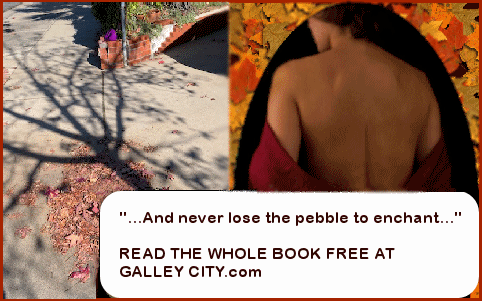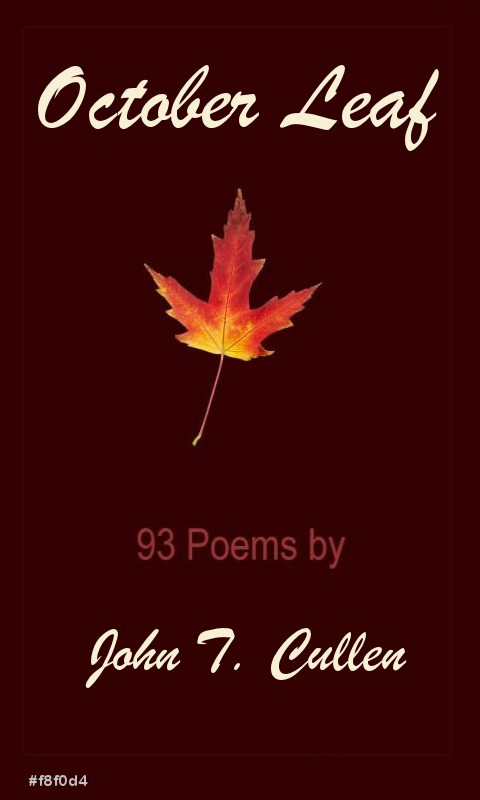|
San Diego Author John T. Cullen
Autumn Leaf: Anthology
Teen/Twenties Poetry. I have written perhaps one poem since my twenties. That poem is titled October Leaf, dating to the mid-2010s, a few Octobers ago. On our quiet residential street here in San Diego, amid all our exotic vegetation, we have some trees that remind an expatriate New Englander of autumn in Boston (or New York, like the movie title). Apparently, sweetgum or liquidambar (Wikipedia) does occur back east. It's a very beautiful tree, with flame-red leaves. I brought one in the house for my wife one day, and had a transcendant experience (mortality) so profound that it made me try on my old poetry gloves that have lain in the shed of disuse since mid-20th Century. It's not the most flowing or jazzy poem I ever wrote, but I felt that leaf's presence breeze through me like the ghost of some unknown and intriguing woman. From that incident, I put together a collection of my long-ago poetry (which I still love very much).
Burnout 27 For Poets and Rockers. There is an ongoing (ominous) mythology about age 27 being an age when many rockstars die. Look at a Wikipedia list for names. I personally remember my shock at the deaths of Janis Joplin, Jim Morrison, and Jimi Hendrix in the 1970-1971 period, and they have lots of company. I'm actually not a conspiracy nut but an extreme rationalist, and I look for sound, defensible, logical ideas to explain the seemingly unexplainable. So for example, in my three books (so far about the notorious 1892 true crime and resulting ghost legend at the Hotel Del Coronado (where I worked for two years part-time as a shuttle driver, having fun in my retirement), I disregarded the ghost hoopla (a lot of it hoaxed, I think) and concentrated on a logical answer to the true crime (see Dead Move, Lethal Journey, and my one other duet in this game, Coronado Mystery (which has its own umbrella website for my Coronado research). Given all of that, I would say from an evolutionary biology standpoint, that 27 appears to be at a sort of average optimum and crest for human mating and hormone storms, all things being equal (circumstances ideal). That's my background theory for why poets and rockers burn out around that age, and a lot of love relations founder about that time. That's why I have usually gravitated (in my nearly forty novels so far, spanning various genres) toward a strong male lead and a strong female lead in their mid-20s to early-30s. My hero and heroine fall in love as they go through tunnels of suspense and thrills, always to emerge in the end with Happy Ever After (HEA). It's all biology, folks, not spookery. Nothing to be skaey-yowed about.
NAME NOTE: When I finally published my teenage novel and poetry, I thought it would be very clever to use the pseudonym A. T. Nager. That's 'a teenager,' right? Nobody got it. A very lovely young clerk at a big bookstore looked it up for me and was excited to tell me that my book was in their system. "A. T. Nogger" she said proudly. That told me all I needed to know. Just like nobody gets the ancient mythological connotation of my Web/SFFH pseudonym John Argo (Ship of Wonder, the Argo, on which Bronze Age Jason and the Argonauts sailed in search of cosmic adventures on the outer space of their time, the Aegean and Pontic Seas. The Argonauts were literally 'Argo-sailors,' on board the wondrous ship Argo. It was already ancient mythology by the age of Homer, and never seems to go away (yay!!). Virgil gathered the Argo story (Jason) into his Metamorphoses ('Changes') two thousand years ago, and in recent years Hollywood has been making movies and TV series about Jason and Argonauts. I'm sure a computer game isn't far away, if it hasn't already been launched.
|
I Saw Mine Coming. My lyrical poetry burnout, that is (I'm over 70 as I write this, and still going strong). But my poetry career ended by about 27. And, as one of my college professors described it, those who keep writing will usually turn from lyrical poetry to prose. That's precisely what I did. Coming from poetry (and worse yet, an English Major, though I took Relateds in Classics, Languages, and History) it took me years to gain any sense of what a commercial, money-hammered environment commercial publishing is, whether in New York City, or in London, or Paris or anywhere else. More info on the commercial vs. artistic aspects some day soon…
When I was about 18 or 19, I took a German Lit class (that's literature, not beer) with a Professor Uhlig. He told us something that resonated within me at the height of my poetic Rausch (intoxication, buzz, high, what have we). He said that most lyrical poets (meaning Rilke, Verlaine, others of their niveau) seem to burn out before age 30. Classic example would be Arthur Rimbaud, a brilliant classicist and oddball whose famous career spanned only a few of his teenage years before he stopped writing, became a gun runner in Africa, and died relatively young.
|
Kindle E-Book
KDP Print Edition
|
No, Arthur Rimbaud didn't hitch hike across the USA, but he might have if he'd been born here a century after his time. Interestingly (Jungian synchronicity?) he spent his childhood in Charleville-Mézières in the Ardennes region of France, maybe an hour's drive today from where I spent my childhood in Luxembourg.
TOP
|
|

|

|
|
So anyway, Prof. Uhlig's words resonated with me, so I had a serious foreshadowing of my own burnout as a lyrical poet before I was 20. Like some of the most portentuous and unavoidable moments of life and fate, I saw it coming. By about 23, after my grand hitching adventure, back in New Haven for a final hurrah there, I typed up all the poems I could find, adding my best shot at a date for when I might have written each poem. I had a cardboard box full of paper scraps, notebooks, napkins, beer coasters, and whatever else I might have scribbled on in moments of inspiration in high school (when I should have been paying attention in class), in college (at UConn, when I often didn't go to class but sat in the now long vanished dive called the Campus Restaurant with other neo-beats and pseudo-hippies or whatever, drinking coffee and smoking cigarettes amid an atmosphere of pounding jukebox rock. Yeah, and one of the letters (the P) was missing on the sign outside. A few of us, of a more philosophical and ironic bent, called it the Camus.
Bottom Line: When I left New Haven for San Diego back in December 1974 on yet another (of several) cross-USA odysseys in my aging rag-top car, I carried my worldly possessions in the trunk and backseat. That included one collection of old poetry (425 pages to be exact) and several novels, which today (2019, Blade Runner Year as I write this) look like a row of ancient manuscripts in a place of honor atop a bookshelf here in my home library—yellowed, brownish, faded, but surviving in those sturdy Yale hardbound thesis binders I bought half a lifetime ago at the Co-op on Broadway in New Haven. One by one, I am evaluating them and paying a young friend type them. Some of my early works will never see the light of day. Others deserve to come out of the darkness at last. A good example is my 27duet.
And so I carried that old binder with my poetry to Germany in my Army duffelbag, and it came back to San Diego with me 5+ years later, and here I am, finally got my one and only faded, yellowed copy typed. I digitized it, and now the work of that teenage poet and twenty-something starving artist, road bum, and Army soldier is finally available for any interested souls to read. I'm not famous or rich, I was sometimes a loner going my own way, but it's been a hell of a wild and interesting ride in many ways. Maybe you'll care to join me on that journey. I'm going to release the contents of October Leaf on this website for the world to read.
|
TOP
|

